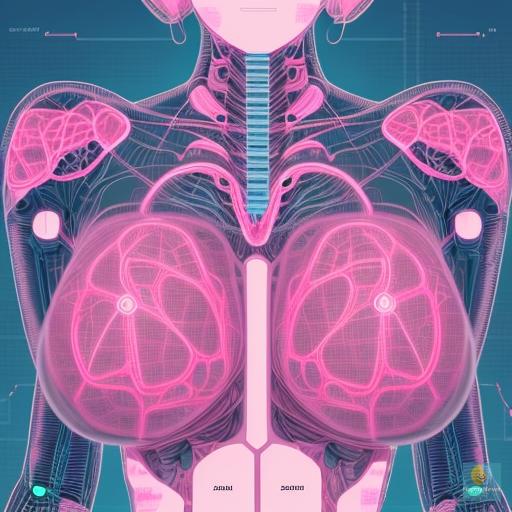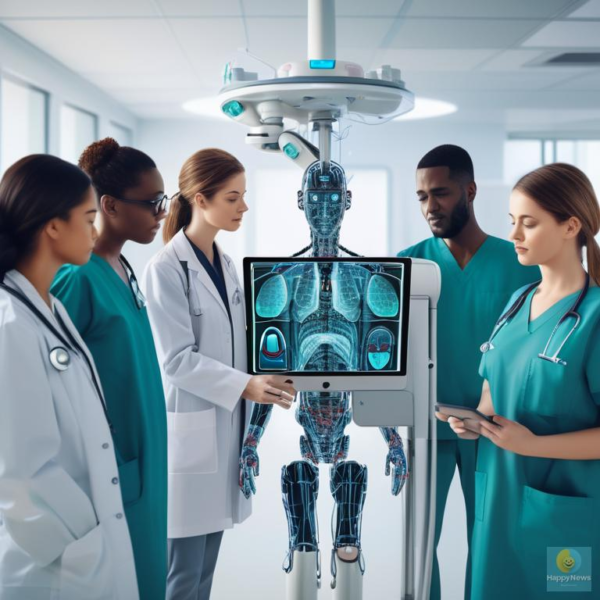- Early AI Cancer Detection: Sheila’s routine mammogram initially showed no signs of cancer.
- AI Advantage: An AI system accurately identified potential cancer cells that radiologists missed.
- Minimal Treatment Needed: Due to early detection, Sheila only required a lumpectomy with no further treatment necessary.
- Future Potential: The success of AI in breast cancer screening opens doors for more comprehensive diagnostic applications.
Introduction to Cancer Detection by AI
Artificial intelligence, particularly in AI cancer detection, is rapidly transforming the landscape of medical diagnostics. By identifying abnormalities that might go unnoticed by human eyes, AI has introduced a new level of precision and accuracy in early cancer detection. A notable example of this advancement is the life-saving diagnosis of Sheila Tooth, a 45-year-old woman from West Sussex, England. Despite her routine mammogram initially appearing clear and undergoing review by two experienced radiologists, an AI-powered system detected potential cancer cells, which ultimately led to timely intervention and effective treatment.
Jump to Section:
- Introduction to Cancer Detection by AI
- The Power of Early Detection: Sheila’s Story
- AI Cancer Detection Tools in Action
- Minimal Treatment with Maximum Impact
- How AI Cancer Detection is Reshaping Healthcare
- Expanding the Scope of Research
- Expanding Research and Improving Patient Outcomes
- Conclusion
- Reference Links and Studies about AI cancer detection:
The Power of Early Detection: Sheila’s Story
Traditional mammography screenings, while effective, occasionally miss smaller or less obvious cancer indicators. However, AI cancer detection steps in as an invaluable tool by analyzing each scan with the knowledge of millions of cases. In Sheila’s situation, the AI algorithm identified a minute anomaly in her mammogram that was missed by radiologists. This early detection allowed Sheila to avoid more invasive diagnostic procedures and potential complications, demonstrating the life-saving potential of AI-driven technology.
1. Higher Detection Rates: AI tools can identify tumors at earlier stages with heightened accuracy.
2. Personalized Patient Insights: AI evaluates data uniquely for each patient, adding a layer of customization.
3. Reduced Human Error: AI minimizes the risk of oversight, especially in complex cases.
4. Improved Workflow Efficiency: Faster diagnoses allow healthcare providers to concentrate on patient care and treatment.
AI Cancer Detection Tools in Action
During Sheila’s screening, the hospital had recently incorporated AI cancer detection software that meticulously reviews mammograms for abnormalities, flagging any potential malignancies. This system detected a small, barely visible anomaly that the radiologists had initially overlooked.
Sheila’s early experience with breast cancer—a non-invasive type successfully treated over a decade ago—further underscored the importance of the AI system in her recent screening. As part of an experimental trial conducted by University Hospitals Sussex, Sheila’s case is a testament to how AI cancer detection can surpass traditional diagnostic capabilities, catching early signs that would otherwise remain undetected.


Sheila’s case exemplifies how AI doesn’t just add value to traditional diagnostics but can also empower doctors to make faster and more accurate decisions. Because of the AI alert, her cancer was detected at Stage 1, making her eligible for less invasive treatment options and significantly improving her prognosis.
Minimal Treatment with Maximum Impact
University Hospitals Sussex conducted this study to evaluate whether AI could improve upon human diagnostic capabilities. The AI system identified subtle signs of cancer that were invisible during manual assessments, leading to Sheila’s early intervention. Her case highlights how AI can detect minute changes in mammograms which may be undetectable even by highly skilled professionals.
Prompt Action and Successful Treatment
Due to the timely detection by AI, Sheila underwent a lumpectomy—a minimally invasive procedure to remove cancerous cells—and did not require additional treatments such as chemotherapy or radiation therapy. This approach significantly reduces her recovery time and overall risk of recurrence compared to more aggressive methods typically required when cancers are detected at later stages.
How AI Cancer Detection is Reshaping Healthcare
Sheila’s story exemplifies the substantial impact that AI cancer detection can have on healthcare, particularly for older patients nearing the age for their final screenings. By identifying potential issues early, AI helps ensure that treatments are both less invasive and more effective, preserving patient quality of life.
This shift in medical technology enables healthcare providers to make better, faster decisions and allocate resources efficiently, ultimately benefiting both patients and medical professionals.
Future Potential of AI Cancer Detection
Sheila’s story demonstrates the immense value AI can bring to early detection and patient care, particularly for older patients who may be approaching their last mammogram screenings. By identifying potential issues earlier than conventional methods, AI helps ensure that treatments remain less invasive and more effective.

Expanding the Scope of Research
The success of AI in detecting Sheila’s early-stage cancer is only the beginning. With such promising results, hospitals and research institutions are channeling resources to expand AI cancer detection beyond breast cancer to include other types of cancers and patient demographics. As research continues, the accuracy and scope of these systems will likely broaden, potentially reshaping diagnostic practices across healthcare fields.
Expanding Research and Improving Patient Outcomes
As AI-driven diagnostic tools advance, the applications of AI cancer detection will grow in complexity and effectiveness. Hospitals and researchers are conducting more studies to measure the impact and refine the technology further. This ongoing research has the potential to unlock new levels of personalized and precise medicine, enhancing early detection and treatment across a wider array of cancers.
Conclusion
Sheila Tooth’s experience with AI detecting her early-stage breast cancer underscores the transformative power of technology in healthcare. This breakthrough not only highlights the life-saving capabilities of AI but also sets a precedent for integrating advanced diagnostics into standard medical practice, enhancing the quality and efficiency of care provided to patients.

Reference Links and Studies about AI cancer detection:
A study, published in Nature, of more than 90,000 mammograms from women in the US and the UK found that an AI system lowered the rate of false positives by 5.7% in the US and 1.2% in the UK.
Breastcancer.org / Artificial Intelligence
You may also Like: 105 Year old woman sets ‘Sky-diving’ record days before passing away!
Similar Posts:
- Whole Grain Wonders: Healthy Foods for You and the Planet
 Switching to a whole grain diet not only revitalizes your health but also contributes to a healthier planet by using fewer … Read more
Switching to a whole grain diet not only revitalizes your health but also contributes to a healthier planet by using fewer … Read more - Rats with Backpacks: The New Heroes Against Smuggling
 Background Imagine a world where small, agile allies are employed to curb the illegal wildlife trade. In an unconventional twist, specially … Read more
Background Imagine a world where small, agile allies are employed to curb the illegal wildlife trade. In an unconventional twist, specially … Read more - Reasearch based top 6 tips on raising “Good Kids”
 Introduction Every parent’s dream is to raise children who are kind, responsible, and emotionally resilient. Harvard psychologists have examined what it … Read more
Introduction Every parent’s dream is to raise children who are kind, responsible, and emotionally resilient. Harvard psychologists have examined what it … Read more - Empowering Children with Dyslexia in Chennai: MDA
 Introduction In 1992, a compassionate group of parents, educators, and philanthropists came together to create the Madras Dyslexia Association (MDA). Their … Read more
Introduction In 1992, a compassionate group of parents, educators, and philanthropists came together to create the Madras Dyslexia Association (MDA). Their … Read more




